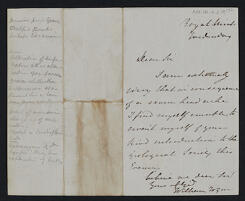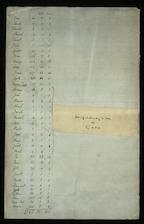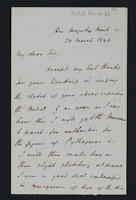Royal Mint - Apologises that he cannot take up Whewell's introduction to the Geological Society due to headache. The verso of the letter contains geological notes in pencil.
Concerning the design of the Wrangham medal.
(The direction, which is not included in the text printed by Marchand, is ‘— Clarke Esqre | 36 Craven Street’. There are no marks of posting.)
Transcript
My dear Sir
I forgot to add to the List the following caution which you can insert—
“Never attempt to move antiquities, &c, by means of a firmaun from Constantinople. The only effectual mode of proceeding is by bribing the local Governors, called Aghas, Waiwodes, &c.”
——————————
You are very kind to offer to execute commissions for me. I shall be much obliged to you to enquire if Lusieri, at Athens, received the Thermometer, &c, which I sent to him by Lord Byron’s Servant.
Also to ascertain, by your own testimony, the truth or falsehood of this assertion which I have constantly made; viz. that the Boccaz of Samos, and the Island of Patmos, may be seen in very clear weather from the top of Mount Hymettus.
If you should want a common Greek Servant and Interpreter, you would find Antonio Manurâchi who lives at Constantinople to be quite a treasure. He understands collecting Medals, Plants, Marbles—is a very good Cook, Musician, &c, &c.—
I think you should also insert in your List one more Memorandum—namely
“To attend to the remains of the painted gothic style of Arch in the Levant, and ascertain the age of any such building”.
I have sent a short note for Lord Byron.
Most truly yours
E. D. Clarke.
Trumpington
July 11th 1813.
—————
No direction or marks of posting.
(The direction, which is not included in the text printed by Marchand, is ‘To Dr. W. Clarke | Trin. Coll. | Cambridge’, with ‘1813 | London Novr. twenty seventh’ above, and ‘Byron’ in the bottom left corner. There are no marks of posting.)
(There is no direction, nor any marks of posting.)
Transcript
South Cave Yorkshire
March 25th, 1872
Dear Sir,
My cousin, Mr J. A. Busfeild who now tenants Upwood, has discovered a short autograph letter of Lord Byron, and has sent me a Copy which I forward to you. From its brevity I fear it will hardly answer your expectation[,] but at least you may like to know what was its natur[e] and purport
Believe me
Yours very faithfu[lly]
W Busfeild
[Docketed, by Clark:] March 25. W. Busfeild | Byron’s letter.
—————
The back leaf of the sheet has been torn away, and the ends of a couple of lines are missing.
Discusses John Horner's health, the excellent harvest and Lord William Bentinck's forces
Dryden Nr Edinburgh. Has not heard from Sharp since he left England, anxiety caused by late harvest, urges Davis to do more foreign business in the city
Encloses an article on Charlemagne for the 'Revue Encyclopedique'
Cassiobury. Discusses the bye-election at Leominster
Upper Brook Street. Discusses the conveyance of Mr Yates' life interest in property
Reports the death of Francis Horner, proposes a monument, danger to Lord Holland in becoming Rector of St Paul's Covent Garden, no distress among the Poor
Belfast. Repudiates his attack on a banking house in Belfast
Kensington. My men will be at your house for the letters, very early to-morrow morning. By day-light, at the latest....They are going to Billingsgate, for fish, at the same time.
Edinburgh. Discusses revenues from tobacco, Hair Powder Act, consolidation of customs and excise
Barn Elm. The printer has had the copy for the Letter to the Pope which is to appear in the Register and is to be made into a little book, the printer is to send copies of each page to John Akerman who will forward them to the bookbinder, Cobbett requires wafers, thin writing paper and a thermometer, looking to sell mangle wurzel.
Barn Elm. Requires tar line or rope yarn, twine of varying strength and a pound of snuff "to assist the brains in their operation"
Barn Elm. Lists payment to be made to his children, encloses material for Rowland
Kensington. Must not send the Corn Book to editors until he writes again













![Letter from David Ricardo to [William Fry]](/uploads/r/trinity-college-library/e/f/9/ef9add8637388c3fafd703224e298ee3389374af334bea8256deb0a90dd1fee0/004.SRMS.B19.2r.tmb.jpg)

![Letter from Sir James Mackintosh to [Thomas Malthus]](/uploads/r/trinity-college-library/9/a/b/9ab07b18f30e003ab9a06a529655259b8bfc0b4788d3b48923e6237805dbe996/002.SRMS.B20.1.front.tmb.jpg)




![Letter from Victor de Riqueti to [Antoine de Sartine, Lieutenant de Police]](/uploads/r/trinity-college-library/d/6/d/d6dbf25a10cda29b36c8d5f3c67c22124e5631bc873b360235adb7d9e8147c0c/002.SRMS.B4.1.front.tmb.jpg)

![Letter from Adam Smith to [Henry Beaufoy]](/uploads/r/trinity-college-library/5/8/8/588976b64b2cd59fad6394a0ce082441b028da7bd2b48659003e53ba23a1799a/007.SRMS.B5.3.front.tmb.jpg)




